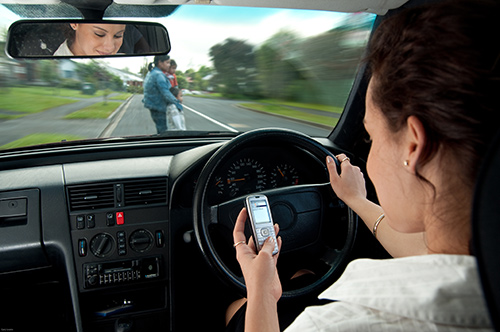
One of the leading causes of car accidents is texting and driving. Texting while driving is an increasingly common practice across all ages. Statistics report that an alarming one in five drivers text while behind the wheel. It is not just a problem with teens anymore! Regardless of who is doing it, one thing remains the same; texting while driving is extremely dangerous and could end up costing you or someone else their lives.
Another name for texting while driving is called distracted driving, which, according to the NHTSA, was responsible for claiming 3,477 lives just in 2015. Distracted driving includes doing things like eating, putting on makeup, texting, messing with the stereo, and talking on the phone while you are operating the vehicle. Even using GPS devices can be a distraction.
To help you break this dangerous driving habit, here are some helpful tips for you and all of the drivers in your home. If your teen driver balks at the new rules, you have to be firm and make it very clear: they follow the rules or they don't drive the car at all.
One option to help teens drive safely is to enroll them in a defensive driving course. This will provide tons of valuable information and tips on how to avoid unsafe practices behind the wheel. Take it with them to make an even stronger impression.
Tips to Stop Texting While Driving:
- Turn the phone's volume to silent (and keep vibrate off) – If you are tempted to grab your phone when it’s ringing or you hear it vibrating, repress this urge by turning the volume and vibration off completely while driving. You can't be tempted by what you don't hear.
- Keep the phone out of sight and reach – For some hardcore texters, having the volume and vibrate feature off may not be enough. They may still be tempted to grab the phone "just in case" someone has texted them. Keeping the phone out of reach and out of sight can fix this problem. Put your purse in the back seat where you can't reach it. For super-stubborn texters, keep your purse or phone in your trunk. Then you won't even try to get to it.
- Pull over and stop if it is important – If it is that urgent to send a message or answer the phone, take a few extra minutes to pull safely off the road and THEN text or answer the phone. It doesn't take long to find a safe place to pull over. If an issue is not important enough to pull over and stop your vehicle properly for, it is not important enough to risk your life by messing with your phone while you are driving.
- Parents lead by example – You can't expect you teen to listen if you ignore the rules while driving. Let them see you turning your phone off and putting it away before you start the car. It will emphasize the point you are making when you require that they do the same. There should be no exceptions to breaking the rules you set. It only takes once to have a text cause you to be involved in a serious and potentially fatal car accident. It's not an age or experience issue, it is a safety and distracted driving issue.
- Use apps that can help monitor your teen while they drive – There are apps that lock the phone while the car is being driven, as well as texting behavior apps that can let a parent know exactly what is going on while the teen is behind the wheel. Regardless of what the teen may want, a parent must ensure, through whatever means necessary, that the no-texting-and-driving rule is being followed at all times.
- There must be consequences – You have to be tough when it comes to enforcing this life-saving and important driving rule. If you find that your teen is texting and driving, the consequences have to be strict and swift. There should be no second chances for this infraction. Letting it go and making it not a big deal could be sentencing your teen to a fatal accident. It IS a big deal, and as long as you treat it that way every single time, your teen will absorb its importance as well.

